Actress Asks Why Iran Is On UN Women’s Commission
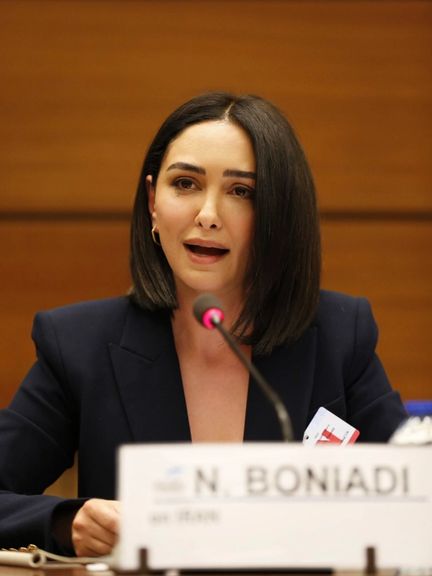
British-Iranian actress and human rights activist Nazanin Boniadi has asked the United Nations why Iran is a member of its Commission on the Status of Women.

British-Iranian actress and human rights activist Nazanin Boniadi has asked the United Nations why Iran is a member of its Commission on the Status of Women.
"If we agree it is a farce for Russia to sit on the Human Rights Council, how can the Islamic Republic of Iran − a regime that subjugates women − be elected to the UN body for gender equality and empowerment of women?" she said Tuesday at the 14th Geneva Summit for Human Rights and Democracy. Members of the Commission on the Status of Women are elected from all continents for four-year terms. Current members include Afghanistan, Israel, Saudi Arabia, and the United States.
Boniadi, who left Iran in 1980 as a baby when her parents became political refugees, cited Narges Mohammadi, who last year refused to answer a court summons, and Zahra Kazemi, a dual Iranian-Canadian photojournalist who died in Tehran’s Evin prison in 2003. Boniadi said that support for UN resolutions over such cases was “the least people of Iran expect from the free world,” and welcomed the UN Human Rights Council extending the mandate of the Special Rapporteur on Human Rights in Iran.
“The people of Iran are being denied their basic human rights,” Boniadi said. “Since the 1979 revolution, the denial of fair trials and due process have been symptoms of the Iranian authorities’ disdain for the rule of law and those defending it, as well as tools for the monopolization of power and the persecution of those who challenge it.”
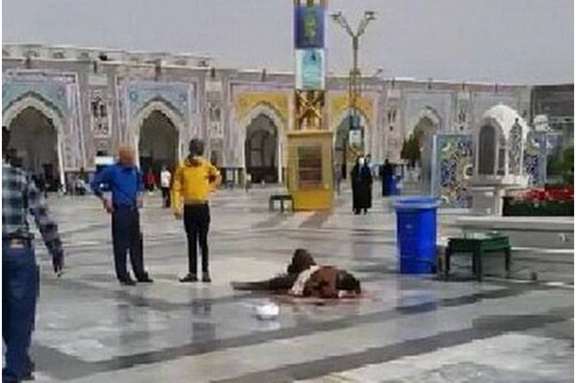
Iranian President Ebrahim Raisi has alleged that Sunni 'Takfiris' were behind the stabbing of three clerics in the holy city of Mashhad on Tuesday.
"This sad incident which was perpetrated by one of the deviant agents of American [-made] Takfiri groups will cause evermore unity and solidarity of those who love Islam and the Islamic Iran and will tarnish deviant groups," Raisi said in a statement Wednesday.
Iranian officials use Takfiri as a vague umbrella term to refer to Sunni dissident groups and individuals in Iran and abroad, alleging that they are organized by western powers and Wahhabis.
A man who officials said Tuesday was a "foreign national" stabbed three clerics in the north-eastern city of Mashhad in Khorasan-e Razavi Province. One of the victims has died and two others who were seriously wounded have been hospitalized.
On Wednesday, Tasnim news agency close to the Revolutionary Guard said the suspect is Abdullatif Moradi, an Afghan of Uzbek ethnicity who entered Iran illegally through Pakistan one year ago. The report also confirmed that six other suspects are under arrest for collaborating with the suspect. Two of the detainees are Moradi’s brothers, Tasnim said and added that they were Takfiri extremists who believed the blood of Shiites must be spilled.
Raisi tasked the intelligence ministry with investigating the rare incident which happened on the third day of the holy month of Ramadan in the courtyard of the shrine of Imam Reza, the eighth imam of Shiites, despite the usual heavy security measures in the compound. Such measures would normally prevent anyone smuggling a knife into the massive shrine complex.

Parliament Speaker Mohammad-Bagher Ghalibaf in parliament on Wednesday condemned the attack and indirectly confirmed that the assailant was of Afghan nationality.
"This incident should not destroy friendship and brotherhood between nations," he said, adding that many Afghans, presumably Afghan Shiites, had fought alongside Iranians during the Iran-Iraq War (1980-1988) and in Syria in the past 10 years.
Mashhad has a very large Afghan community most of whom are Sunnis. Afghans mostly live in poverty-stricken neighborhoods of the city including where the assailant reportedly lived and the three clerics engaged in Shiite religious activities, the deputy of the Islamic Propaganda Organization said.
Millions of Afghans have lived in Iran as refugees or economic migrants for many years and their numbers have been increasing considerably since the Taliban takeover of the government in Kabul last year. Officials say as many as 5,000 Afghans enter Iran on a daily basis through official borders now while a large number also enter illegally whose numbers are not known.
The Imam Reza Shrine assailant's motive for the attack is not clear. Immediately after the incident some social media users said they suspected a connection with the Saturday shooting of two Sunni clerics in front of aSunni seminary mosque in Gonbad Kavus. The two incidents could have been meant to cause strife between Shiites and the minority Sunnis in the country, they said.
The majority of people in Gonbad Kavus, the second-largest city of the northern province of Golestan, are Sunni Turkmens.
Deputy governor of Golestan Province, Mehdi Dehrouyeh, on Monday said a suspect was being interrogated in connection with the gun attack on Sunni clerics, adding that it was highly likely that there were "personal reasons" for it.
The ultra-hardliner Kayhan newspaper on Wednesday said the incidents in Gonbad Kavus and Mashhad could be part of a "plot" to cause Shiite-Sunni sectarianism.
"It appears that the incident in Mashhad yesterday was part of a security puzzle designed by conspirators to create a national security crisis and sedition through causing a division between the Iranian nation and foreign nationals and discord between Shiites and Sunnis," Kayhan wrote.
Iranian officials often refer to Afghan refugees and economic migrants living in Iran as "foreign nationals".
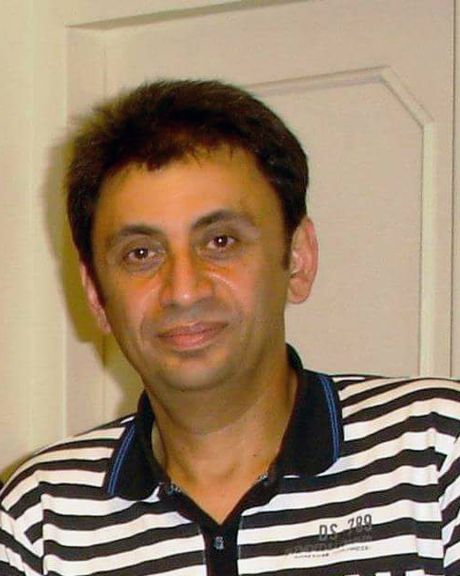
The Iranian-American wife of Shahab Dalili who has been detained in Iran for six years, has asked the Biden administration to secure the release of her husband.
Nahid Dalili told NBC News on Tuesday that she fears Washington and Tehran are close to a prisoner swap deal but her husband will be left behind.
Fifty-nine-year-old Dalili, who was arrested in 2016 while visiting Tehran for his father’s funeral charged with "aiding and abetting" the US, is a legal permanent resident, but not a citizen.
Nahid said she hadn’t spoken publicly about her husband’s case out of fear of jeopardizing his possible release, but when she heard US officials in the Biden administration refer to “four” Americans imprisoned in Iran, she decided in March to break her silence.
“I want them to hear me. They can’t say they didn’t know about this,” she said. “The Biden administration shouldn’t leave Shahab behind. He is a permanent legal resident, and all of his family are citizens.”
British Iranian Nazanin Zaghari-Ratcliffe and Anoosheh Ashoori were freed in March after the UK paid a four-decade-old £400m ($522 million) debt to Iran.
Iran is still holding several other western dual nationals including American-Iranians Siyamak Namazi and his elderly father Bagher, American-Iranian businessman Emad Sharghi, and German-Iranian rights activist Nahid Taghavi.
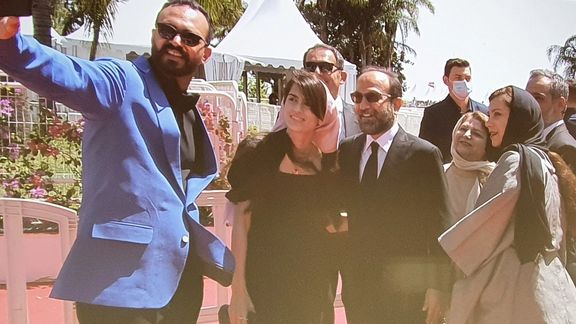
A prosecutor in Tehran has indicted Iran's internationally acclaimed film director Asghar Farhadi for alleged plagiarisms.
The prosecutor decided that Farhadi, a twice Oscar winning filmmaker, has violated the intellectual property rights of one of his students at a filmmaking workshop in Tehran and the court has issued a summons.
According to the prosecutor, Farhadi's latest movie, A Hero, has been made based on the core idea of Azadeh Masihzadeh's documentary All Winners, All Losers.
As Farhadi's movie has European producers and distributors, the case has stirred controversy in the international film journals such as Hollywood Reporter. Lawyers in Europe and Iran are still chasing the case.
Farhadi's lawyer in Tehran, Kaveh Rad, said on his Instagram page that both Masihzadeh and the man whose life story was used in the film had filed complaints that have reportedly convinced the prosecutor in Tehran that Farhadi is guilty.
However, Rad, strangely denied that the court has accepted the arguments of the young filmmaker and the prisoner whose personal story has been made public in Farhadi's movie, and according to him, has damaged his reputation.
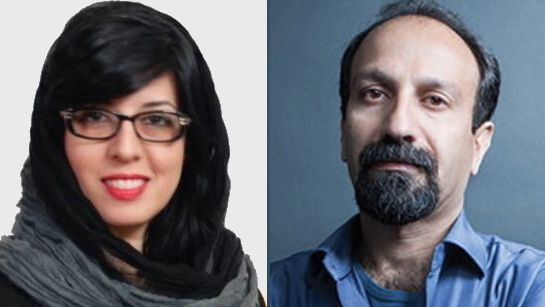
Rad said that even if the first court finds him guilty another court might over-rule the verdict and restore Farhadi's right over his movie.
According to Masihzadeh in her interviews with Iranian and foreign-based media, she shared her idea with Farhadi in the classroom and told him that she was going to make a documentary about a man who found a large amount of money and returned it to the person who had lost it.
About a year later, Farhadi made A Hero based on the same story and according to Massihzadeh, refused to pay her for the idea or to give her credit for her story in the film's title. Massihzadeh said that Farhadi forced her to sign papers to withdraw her claim, but she was lucky enough to have witnesses.
She told the media that Farhadi refused to see her and listen to her afterwards as his film became internationally acclaimed and was welcomed at several film festivals in Europe and America. It was also nominated for an Oscar, but it was not shortlisted for the award. At the time, Farhadi filed counter-complaints against Massihzadeh's charges, but she told Khabar Online in Tehran that the prosecutor ruled out Farhadi's argument.
Massihzadeh, then made her documentary available on Youtube, where film critics had a chance to decide for themselves about the charge of plagiarism.
Some Iranians on social media have said that plagiarism is Farhadi's personal problem, but he should be accountable for whitewashing the Islamic Republic's crimes. Farhadi was criticized by critics for showing Iranian prisons in a very good and favorable light in his film.
He was also criticized during the Cannes Film Festival in France for turning a blind eye to major social and political events such as the downing of a civilian aircraft by the IRGC in 2020, while he had a good opportunity to name and shame the culprits at international forum.
In his defense, Farhadi denied being an accomplice of the regime, and claimed that his passport was confiscated at the airport when he was returning from film festivals abroad.
CORRECTION: In its version, this report had said Farhadi was "reportedly convicted". This was a reporting error for which we apologize.
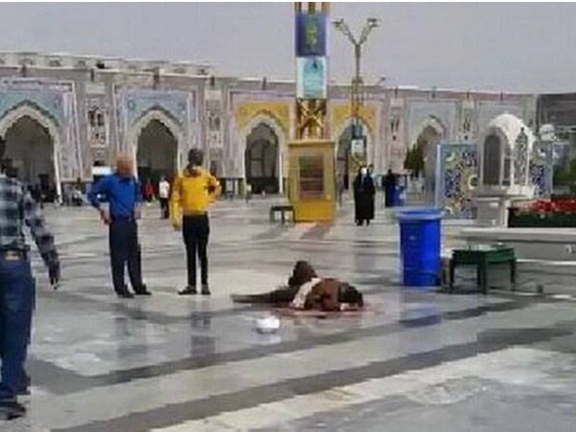
In a rare incident Tuesday, a man said to be a foreigner, stabbed three clerics in Iran's largest Shiite shrine in Mashhad, killing one of them instantly.
The incident happened during the third day of the holy month of Ramadan at the shrine of Imam Reza, the eighth imam of Shiites, in the north-eastern city of Mashhad in Khorasan- Razavi Province despite the usual heavy security measures taken at the shrine.
Mahmoud Arefi, homicide prosecutor of Mashhad Public and Revolutionary Court, said Tuesday evening that two clerics wounded by the assailant were being treated at hospital and were in stable conditions. Iran's official and semi-official news agencies said the three clerics were seminary students and active volunteers in the slum areas of the city.
The official news agency IRNA posted a video of police arresting the assailant. Videos posted on social media show the victim, named as Mohammad Aslani, with the clerical rank of Hojjat ol-Eslam, in a pool of blood on the marble courtyard of the shrine after the stabbing.
Public and Revolutionary Prosecutor of Mashhad, Mohammad-Hossein Darrudi, said hours after the incident that five men were arrested in connection with the stabbing including the assailant and four suspected of collaborating with him.
Darrudi said the assailant was a "foreign national" and that further information would be announced after completion of the investigation. Iranian officials often refer to Afghan refugees and economic migrants living in Iran as "foreign nationals".
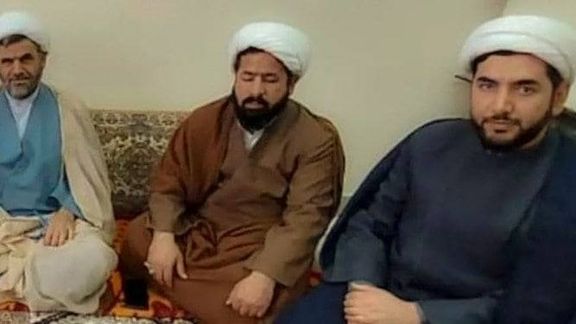
The political, social, and security deputy of Khorasan-Razavi Governor's Office, Hadi Tabatabaei, told Fars news agency that officials were meeting at the Governor's Office regarding Tuesday's stabbing and "various aspects of the incident" were being investigated.
The assailant's motive for the attack on the Shiite clerics in Mashhad is not clear. Some people on social media say they suspect a connection with the shooting of two Sunni clerics at a mosque in Gonbad Kavus, northernIran, two days earlier.
Some government supporters on social media have called the incident a terrorist attack by[Sunni] Wahhabis. Authorities have offered no explanation. They claim the attack was meant to cause strife between Iran's majority Shiites and Sunnis who constitute around 10 percent of the population.
An informed source speaking on condition of anonymity told Fars news agency that the assailant lived in the same Mashhad neighborhood as those he attacked. He also said that people in the neighborhood say the assailant had mental health issues and held personal grudges against the victims. However, this does not fit the theory that five other people helped the attacker.
Hostility towards clerics has been on the rise in Iran. In January a well-known cleric, Mohammadreza Zaeri, who often appears on state-controlled television programs, said people had a level of hatred and grudge against clerics that was creating a social crisis.
Zaeri said taxi drivers refused to pick him up and that he had been spat on and sworn at a few times recently. Another cleric, the reformist Mohammad-Taghi Fazel-Meybodi, also said in January that clerics and seminary students were avoiding their usual garb for fear of being insulted in public.
In late December, it was reported that a woman had been arrested at an earlier date in the religious city of Qom, after swearing at a cleric and trampling on his turban because he had hit her on the head with his cane for not complying with hijab rules.
Many Iranians see the clergy as responsible for their economic hardship and lack of social freedoms.

The chief of staff of the Israeli Defense Forces says the air force has accelerated preparation for action against the Islamic Republic.
Speaking at a ceremony to assign a new air force commander on Monday, Lieutenant General Aviv Kochavi said that the missions are expanding in different fields including “the readiness for action in Iran, which is currently in an accelerated process of preparation”.
He added that Israel is also upgrading its wide range of aircraft and airborne sensors and increasing and perfecting the scope of aerial attacks of all kinds.
The strikes by the air force have "decisive impact" in preventing Iranian forces from entrenching themselves in Syria, keeping Hezbollah out of the southern Golan Heights, and preventing Israel's enemies from "gaining advanced weapons systems", he said.
Expressing concerns over increased violence during the Islamic fasting month of Ramadan, he said security forces have foiled at least 10 attempted attacks in the last two weeks.
A total of 11 people were killed in a one-week period in a succession of fatal attacks -- a car-ramming and stabbing spree in Beersheba, mass shootings in Bnei Brak and Hadera, and a stabbing in Gush Etzion.
The attacks were praised by Iran-backed Lebanese Hezbollah and media affiliated with Iran Revolutionary Guards.